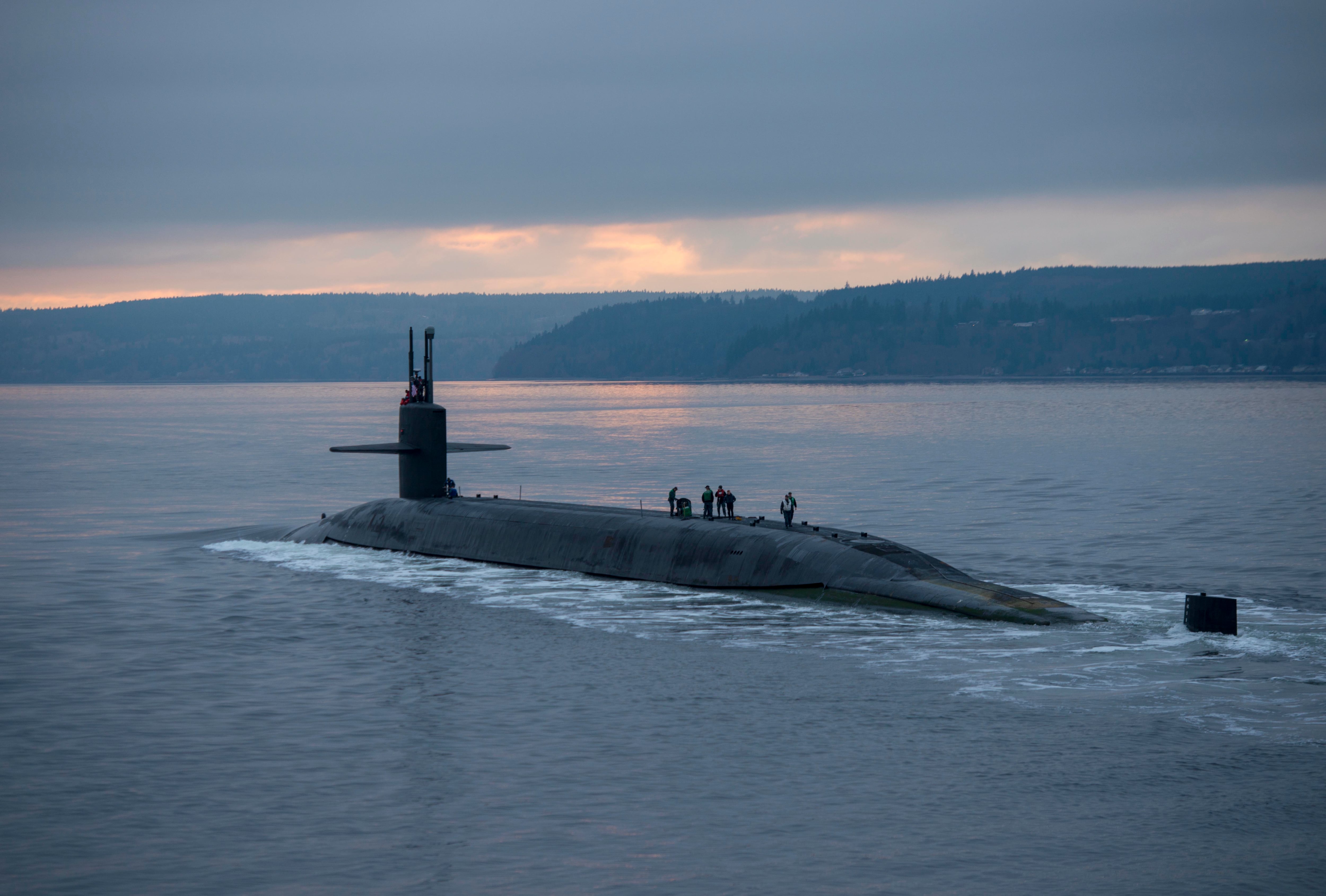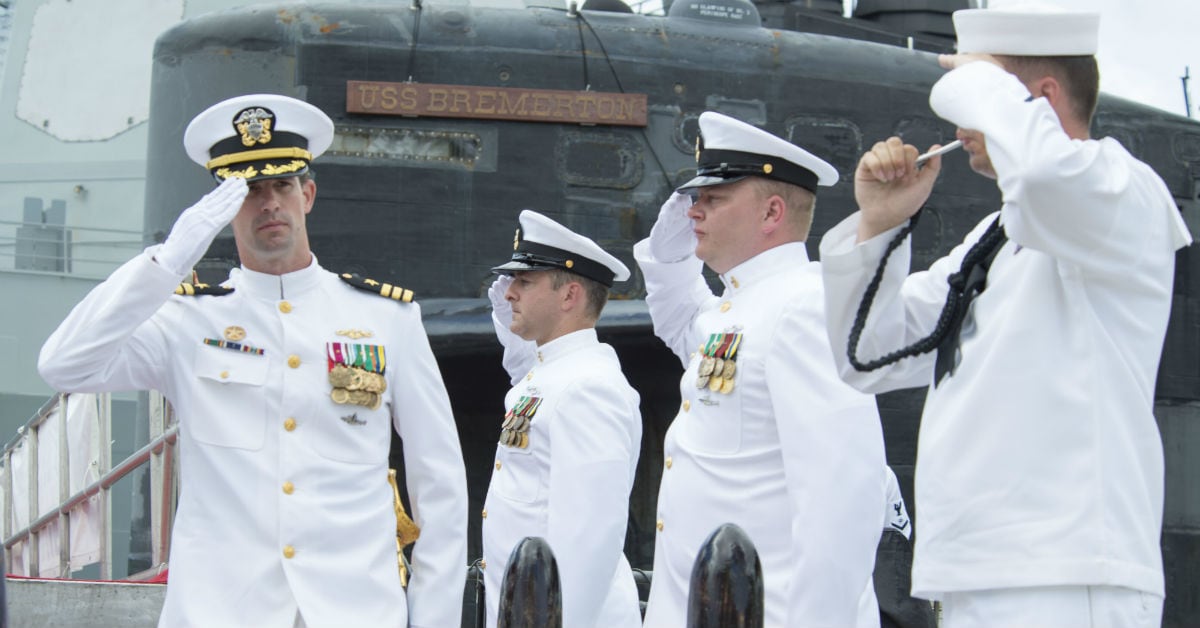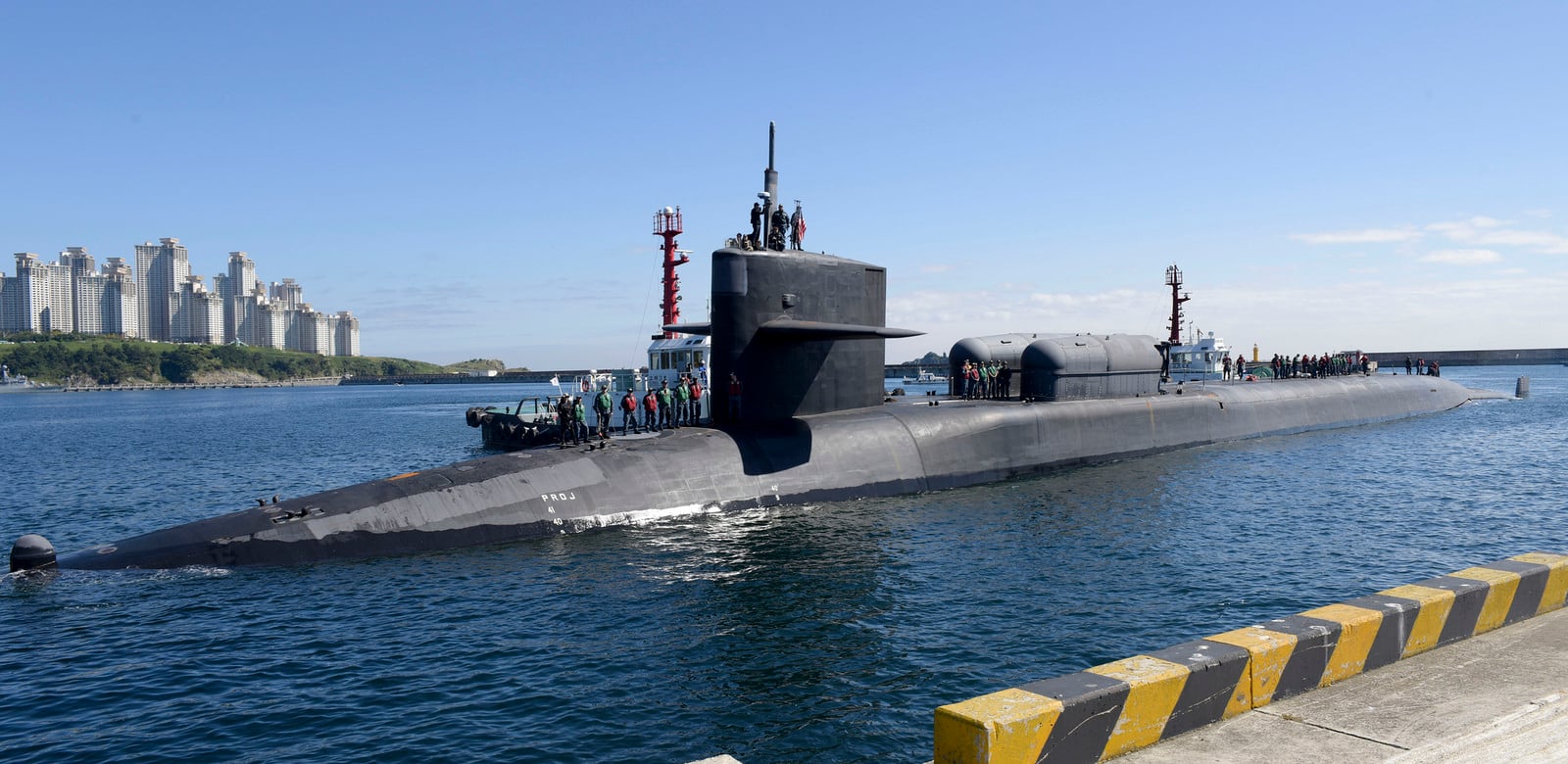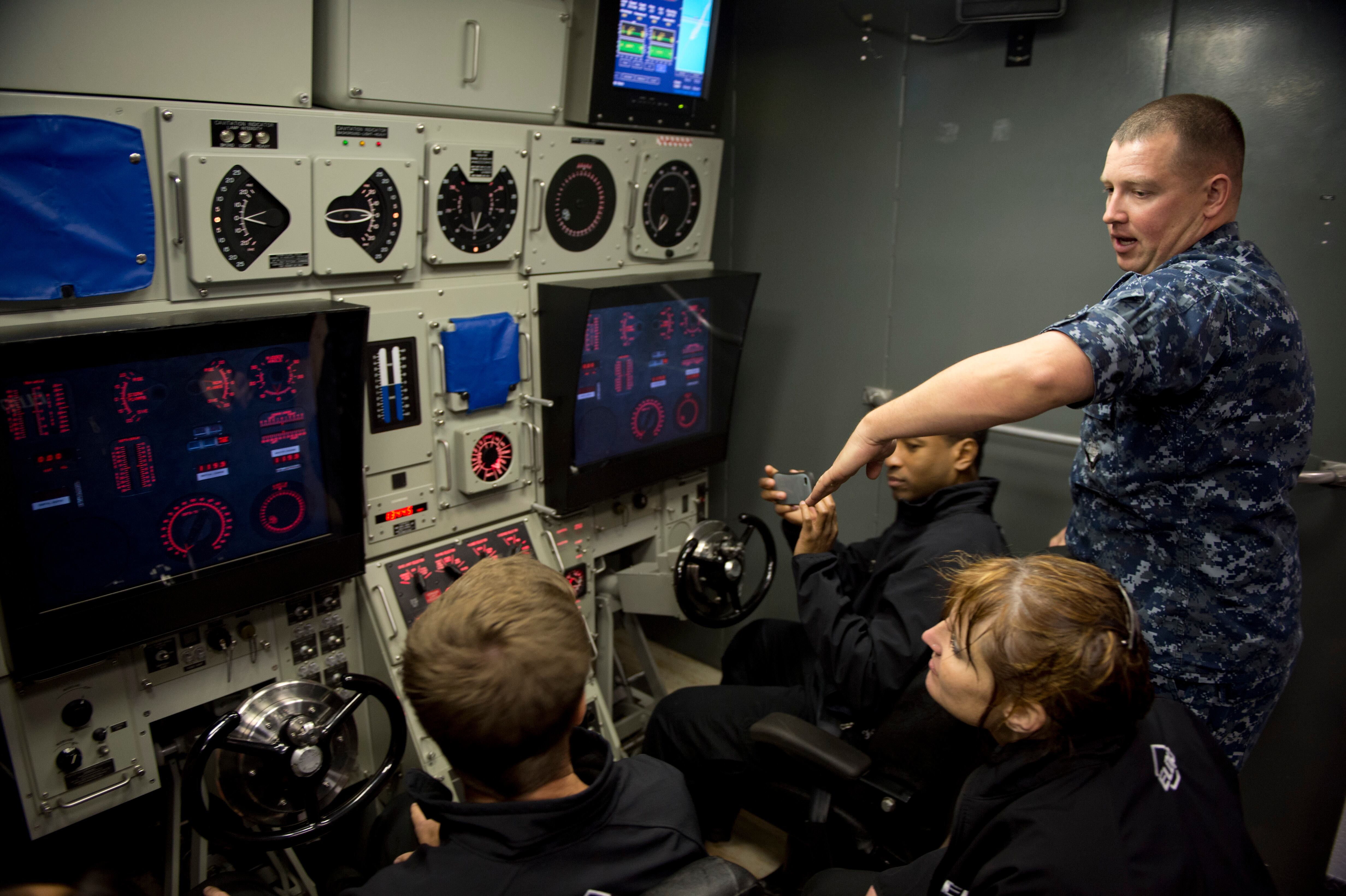The Navy recently prosecuted or administratively punished six submarine officers at Naval Base Kitsap-Bangor for narcotics offenses, officials confirmed this week.
Two of those officers — Lt. j.g. Riley W. Hoffmann and Lt. Alexander J. Egber — served on the Blue Crew of the ballistic missile submarine Pennsylvania, one of the Navy’s “boomers” that carry nuclear weapons.
A third submariner, Lt. James W. Hendren, was assigned to the guided-missile submarine Michigan.
Three other officers overseen by Submarine Group 9 have been administratively disciplined for drug offenses this year, according to Lt. Mack Jamieson, a group spokesman.
Declining to elaborate on the nature of their alleged crimes, Jamieson cited federal privacy rules for not providing the names and ranks of the officers who received nonjudicial punishment.
Asked whether military leaders were concerned that this rash of officer drug cases might signal a broader problem plaguing the underwater fleet, Jamieson told Navy Times they “take all allegations of drug use seriously.”
“The Navy has a robust drug prevention program in place to inform sailors not to use illegal drugs and ensure sailors are aware of what can happen if they violate this policy,” he said.
RELATED

The Navy’s probe began after a junior officer popped positive for an unnamed illegal drug during a routine urinalysis, Jamieson told Navy Times.
As the investigation widened, it netted Hoffmann, Egber and Hendren, Jamieson added.
Hendren and Hoffmann have pleaded guilty in recent weeks, while Egber is scheduled for arraignment later this month.
Egber is charged with using cocaine, the stimulant Adderall and the synthetic mood-changing drug MDMA —better known by street names “Ecstasy,” “Ex” or “Molly” — in San Francisco and Berkeley, California, in October and November of 2017, according to his charge sheet.
The following month, he used and distributed cocaine in Seattle and also solicited another unnamed person to distribute it, military prosecutors allege.
Egber’s civilian defense attorney, Jason Greene, declined comment this week.
Prosecutors charged Hoffmann with using and distributing cocaine in Seattle in late 2017, plus possessing MDMA.
As part of a pretrial deal, he pleaded guilty on Oct. 9 at a special-court martial hearing to using and possessing the drugs, Jamieson said.
The military judge sentenced him to forfeit $6,000 in pay over the span of a year, a reprimand and two months of restriction on Naval Base Kitsap-Bangor.
Under the terms of the plea deal, however, both the pay forfeiture and restriction were suspended, Jamieson wrote in an email to Navy Times.
Hoffmann’s civilian defense attorney, Steven Krupa, declined comment.
RELATED

Hendren pleaded guilty Oct. 23 to conduct unbecoming an officer and a gentleman and illegal drug distribution in Seattle, where he lived, according to Navy spokesman Joe Kubistek.
He was sentenced to 150 days behind bars, a letter of reprimand and $20,000 in pay forfeitures over the span of five months, Kubistek said.
Hendren’s civilian defense counsel, Michael Berens, questioned the severity of the sentence.
“The conduct was relatively minor, but the exposure and tack taken by the prosecutors was rather extreme,” Berens said.
Berens told Navy Times that a fellow officer who had missed his ferry home arrived at Hendren’s apartment and asked if he had any cocaine. Because he shared the drug — what the attorney called a “buddy distro” — Hendren drew the charge.
Hendren’s conduct unbecoming plea stemmed from putting a civilian in touch with a drug dealer on July 26, after he’d already had been hit with the original charges, Berens told Navy Times.
“Lt. Hendren was facing charges and then he pleaded guilty to arranging an additional drug deal,” Berens said. “He basically put a civilian in contact with a drug dealer when he was facing charges.”

Records provided by Berens allege that Egber snitched on Hendren.
In an Aug. 23 affidavit attached to a search warrant request targeting Hendren’s cellphone, Naval Criminal Investigative Service Special Agent Chris Garlinghouse wrote that Egber said Hendren facilitated a July 26 coke buy.
Garlinghouse described Hendren and Egber meeting two unnamed civilians at a Seattle bar that night after work.
Over the next few hours, Hendren texted a dealer and then took the civilians to an apartment building to get drugs, according to the affidavit.
Hendren said he "did not want Lt. Egber to witness anything,” so he went upstairs but arranged to meet later to go to dinner, Garlinghouse wrote.
On the way to the restaurant, Egber asked Hendren what happened but was told “it’s not his business,” the affidavit stated.
Egber kept asking until Hendren “became defensive and stated he does not know what he is talking about,” the agent wrote.
RELATED

Hendren walked into work on Aug. 23 and was met by NCIS agents who seized his phone, according to an affidavit penned by Hendren five days later.
“Lt. Hendren was placed into handcuffs and leg shackles and then paraded through Navy medical spaces, and then driven to his off-base downtown Seattle apartment and was forced to walk outside on public streets while shackled in uniform,” Hendren’s Navy attorney, Lt. Cmdr. Michael Whitican, added in an Aug. 29 motion.
Hendren’s affidavit accused the Navy of preventing him from calling for family or legal counsel for three days after he was incarcerated.
“We’ve got parents thinking their son might be dead, and mum’s the word,” Berens said. “Why couldn’t the command reach out?”
Hendren spent two months behind bars before he entered a plea. The initial 13 days were spent in solitary confinement and he faced two more days in the hole after his plea hearing, according to his attorney.
“This is a relatively minor drug charge,” Berens said. “We’ve got somebody in solitary for two weeks.”
Navy spokesman Jamieson said authorities "followed standard procedure as laid out in the manual for court-martial throughout the process.”
RELATED

Hendren’s commitment to the Navy was slated to expire in May, and he’d told superiors he was leaving the service before the probe kicked off, Berens told Navy Times.
To Berens, Hendren’s deepening substance abuse problem and his decision to depart a promising military career stemmed from the same cause — unspecified “risks taken by superiors at sea.”
Hendren was on “several top-secret missions,” where “the command had made decisions that put everyone at risk,” Berens said.
In a clemency request forwarded Friday to the commander of Navy Region Northwest, Rear Adm. Christopher Gray, Hendren’s legal team argued that the lieutenant drew a harsh sentence compared to those meted out to peers with similar charges.
They’ve asked Gray to lop 30 days off Hendren’s confinement at the Joint Base Lewis-McChord Northwest Regional Correctional Facility, about an hour’s drive from his submarine’s base.
“Please also know there is some evidence that LT Hendren’s command suspected that he may have an alcohol dependency issue, stemming in part from being involved in two perilous incidents at sea, that was never properly addressed by (Substance Abuse Rehabilitation Program) providers,” the attorneys wrote.
“Had LT Hendren received counseling and treatment when the command identified the possibility of an alcohol dependency issue, LT Hendren may have separated as planned in May/June 2019 under Honorable conditions.”
In a letter to Gray, Hendren added that his mother had suffered a stroke and “it is probable this will be her last holiday season.”
“I have not spent a holiday season at home for the past 3 years due to forward deployments on USS Michigan,” he wrote. “I am writing to ask for 30 days removed from my sentence, so I may spend the holidays with my mother as her only child.”
Berens said he hopes to receive an answer soon.
Geoff is the managing editor of Military Times, but he still loves writing stories. He covered Iraq and Afghanistan extensively and was a reporter at the Chicago Tribune. He welcomes any and all kinds of tips at geoffz@militarytimes.com.




